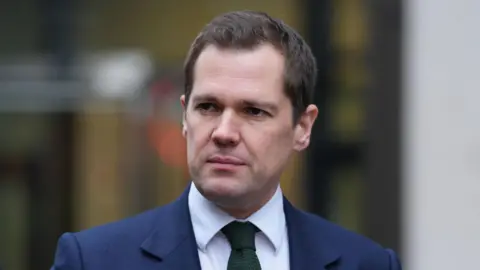In a recent statement, Krish Kandiah, a notable charity leader and theologian, extended what he referred to as an “olive branch” to Robert Jenrick, the shadow justice secretary. This comment followed a heated debate sparked during a segment on BBC Radio 4’s Thought for the Day, where Kandiah had accused Jenrick of promoting xenophobic sentiments. The backlash from Kandiah’s assertion, made on August 15, prompted both Jenrick and the BBC to respond.
Jenrick argued against Kandiah’s claim, stating that the insinuation implied that individuals worried about the safety of their children concerning illegal migrants are labeled racist. He expressed his discontent with how the discussion unfolded, emphasizing that parental concern should not be conflated with prejudice. This disagreement led to a larger debate about the way immigration and its social implications are addressed in public discourse. The controversy culminated when the BBC, after receiving public feedback, issued an apology for including what many considered biased language in the Thought for the Day segment, subsequently removing the contentious comment from the BBC Sounds service.
In a follow-up message to Jenrick, Kandiah highlighted the need for collaboration to address societal fears regarding immigration. He noted, “I would love to find a way we could work together to de-escalate the fear and anger many are feeling in our country.” Kandiah is renowned for his work with the Sanctuary Foundation, which focuses on aiding refugees from conflict-stricken areas, including those from Afghanistan and Ukraine. He expressed a genuine desire to channel the energy from societal unrest toward solving pressing issues like housing, jobs, and the rising cost of living instead of fostering anti-immigrant sentiments.
The conversation took a more intense turn when Kandiah referred specifically to remarks made by Jenrick in an opinion piece for the Mail on Sunday. In that article, Jenrick noted a personal hesitation about sharing a neighborhood with immigrants from what he described as “backward countries,” thereby exposing an underlying sentiment of fear associated with the unknown — a notion Kandiah directly linked to xenophobia. He said, “These words echo a fear many have absorbed – fear of the stranger. The technical name for this is xenophobia. All phobias are, by definition, irrational. Nevertheless, they have a huge impact.”
Kandiah recognized that while fear of the unknown is natural, the result has been negative societal consequences, such as the rising tide of protests against accommodations for asylum seekers, which perpetuated division and animosity within communities. This public outcry, he contended, needs to be addressed with empathy and understanding rather than scorn or disdain.
In response to the segment, Jenrick defended his position by framing parental concern over illegal migration as a legitimate and protective instinct, insisting that suggesting such sentiments equate to racism is fundamentally misguided. He articulated that good parenting involves looking out for one’s family, and his response was met with a degree of support from his political base.
In summation, the exchange between Kandiah and Jenrick illustrates a broader societal struggle regarding the perceptions and realities of immigration in the UK. The episode at the BBC highlighted significant divisions in public opinion, revealing a longing for a more constructive dialogue addressing underlying societal fears while seeking to nurture cohesion rather than sow discord. Through offers of collaboration and an emphasis on pressing economic concerns, there remains hope that meaningful conversations can lead to solutions that foster understanding and compassion among the diverse populations within the UK.











